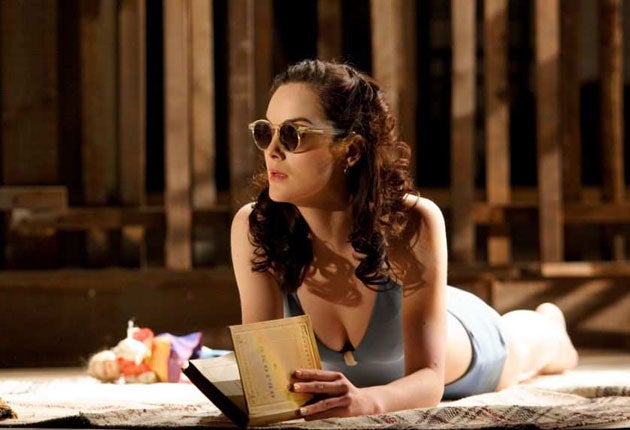Burnt By The Sun, National Theatre, London

There are a lot of movie adaptations on the London stage at the moment but this one takes the palm as a really fine new play by Peter Flannery – best known as the television writer of Our Friends in the North and the recent Civil War bodice-ripper The Devil's Whore – based on Burnt by the Sun, the outstanding Russian film that won an Oscar in 1994.
The year is 1936 and the Lyttelton stage at the National heaves in the heat of a summer holiday celebrating the launch of Stalin's air balloons. The pioneers are on the march, the planes roar overheard and the tanks are moving into the wheat fields.
On a revolving country dacha 20 miles outside Moscow, the grizzled old Red Army hero, General Kotov (Ciaran Hinds), and his much younger wife Maroussia (Michelle Dockery), with their child Nadia and extended family of grandmothers and cousins, sing and reminisce, but only after Kotov has pulled rank on the soldiers in the fields. There's a split developing between the old guard and the new reforms.
Into this threatened idyll comes Maroussia's childhood sweetheart Mitia, first disguised as a comedy tramp at the end of the pioneers' procession. Rory Kinnear then launches an amazing performance of musical prowess and ambivalent motivation – he went away 12 years ago; why has he come back? – creating a gripping theatrical spine to the day-long upheaval.
This compression of the film without losing any of its key moments or its sense of scale, is a brilliant playwriting achievement, seamlessly realised in Howard Davies's masterly production and Vicki Mortimer's design.
It's as though Gorky had survived Stalin (who probably had him shot in 1936, ironically enough) and collaborated in the afterlife with a revisionist view of the Revolution informed by historical information about the political police, the White Army generals and the reign of terror. But Flannery hasn't written a history lesson. It's a wonderful panoramic view of a family and its misfortune with an inexorable, gruesome dramatic tread.
Hinds stalks his rival with the bullish scorn of the old soldier who's earned his spurs and can't see what's coming. Mitia is going to make Kotov sign some form of confession, while the family are planning a trip to the zoo.
Flannery has also highlighted the mini-drama of the maiden housemaid Mokhova (Stephanie Jacob) who glimpses happiness in the company of a wandering peasant, and little Nadia, confidently played on opening night by Holly Gibbs, senses danger as Mitia recounts his prophetic parable of the fairytale prince who had to make a choice between love and duty.
The play is billed as "from the screenplay by Nikita Mikhalkov and Rustam Ibragimbekov." Flannery has performed the miracle of re-releasing a film, not reducing it, as theatre.
To 21 May (020 7452 3000; www.nationaltheatre.org.uk)
Join our commenting forum
Join thought-provoking conversations, follow other Independent readers and see their replies
Comments
Bookmark popover
Removed from bookmarks